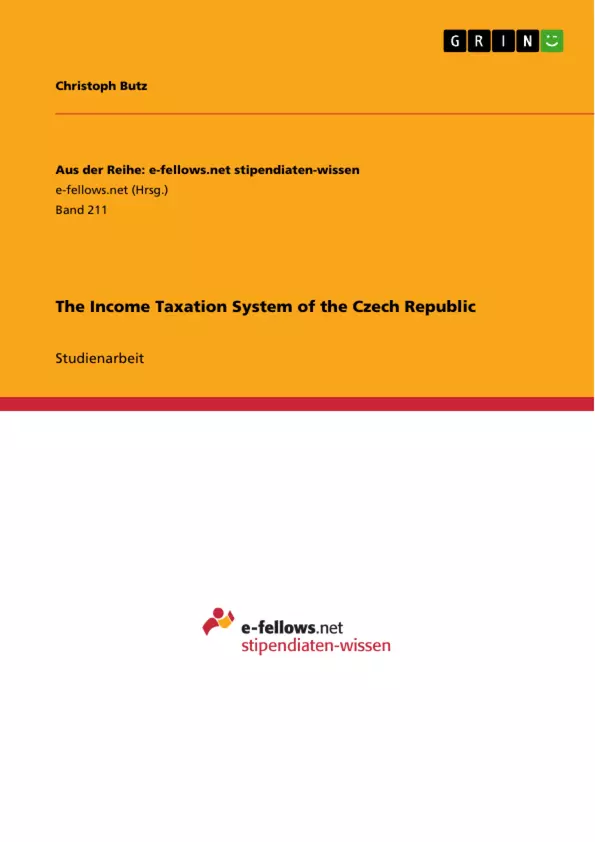The objective of this paper is to analyze the general principles of an income taxation system with regard to its realization and application in a specific European country, i.e. the Czech Republic. Therefore, the principles of an ideal tax system are introduced first, before relating those concepts to the respective tax rules of the Czech Republic. Specifically, the type of income taxes, the definition of a resident taxpayer, the income categories, personal allowances and family taxation, and the tax rate of the country will be presented and linked to the general principles of a tax system. Please note that the Czech Republic uses the Czech crown as a currency. All numbers quoted have been converted into the Euro using the following exchange rate: 24.45 CZK = 1 EUR.
Inhaltsverzeichnis
- Introduction
- General Principles of Income Taxation
- Income Taxation in the Czech Republic
- Type of Income Taxes and Surcharges
- Definition of a Resident Taxpayer
- Income Categories
- Personal Allowances and Family Taxation
- Tax Rate
- Conclusion
- References
Zielsetzung und Themenschwerpunkte
Dieser Beitrag analysiert die allgemeinen Prinzipien eines Einkommensteuersystems und deren Umsetzung in einem spezifischen europäischen Land, der Tschechischen Republik. Es werden zunächst die Prinzipien eines idealen Steuersystems vorgestellt, bevor diese auf die entsprechenden Steuerregelungen der Tschechischen Republik angewendet werden. Konkret werden die Arten der Einkommensteuern, die Definition eines steuerpflichtigen Ansässigen, die Einkommensarten, die persönlichen Freibeträge und die Familiensteuer sowie der Steuersatz des Landes vorgestellt und mit den allgemeinen Prinzipien eines Steuersystems verknüpft.
- Prinzipien eines idealen Steuersystems
- Einkommensteuersystem der Tschechischen Republik
- Definition eines steuerpflichtigen Ansässigen
- Einkommensarten und Steuerbefreiungen
- Steuersatz und Steuersystem
Zusammenfassung der Kapitel
Die Einleitung führt in die Thematik der Einkommensteuer ein und erläutert die Zielsetzung des Beitrags. Das zweite Kapitel befasst sich mit den allgemeinen Prinzipien eines Steuersystems, wobei die sechs wichtigsten Prinzipien - ausreichende und stabile Steuereinnahmen, Effizienz/Neutralität, vertikale und horizontale Gerechtigkeit, minimale Kosten der Verwaltung und Compliance, Flexibilität, Einfachheit und Transparenz sowie internationale Wettbewerbsfähigkeit - vorgestellt werden. Das dritte Kapitel behandelt die Anwendung dieser Prinzipien auf das Einkommensteuersystem der Tschechischen Republik. Hierbei werden die verschiedenen Arten von Einkommensteuern, die Definition eines steuerpflichtigen Ansässigen, die Einkommensarten, die persönlichen Freibeträge und die Familiensteuer sowie der Steuersatz des Landes detailliert betrachtet.
Schlüsselwörter
Einkommensteuer, Steuerprinzipien, Tschechische Republik, Steuersystem, Ansässiger, Einkommenskategorien, persönliche Freibeträge, Familiensteuer, Steuersatz, Effizienz, Gerechtigkeit, Flexibilität, Transparenz, internationale Wettbewerbsfähigkeit.
Häufig gestellte Fragen
Was sind die Grundprinzipien eines idealen Steuersystems?
Ein ideales System sollte stabil, effizient (neutral), gerecht (vertikal und horizontal), flexibel, transparent und international wettbewerbsfähig sein.
Wer gilt in der Tschechischen Republik als steuerpflichtiger Ansässiger?
Als ansässig gilt, wer in der Tschechischen Republik einen ständigen Wohnsitz hat oder sich dort mindestens 183 Tage im Kalenderjahr aufhält.
Welche Einkommensarten werden unterschieden?
Das tschechische Recht unterscheidet verschiedene Kategorien, darunter Einkünfte aus nichtselbstständiger Arbeit, gewerblicher Tätigkeit, Kapitalvermögen, Vermietung und Verpachtung sowie sonstige Einkünfte.
Gibt es in Tschechien persönliche Freibeträge?
Ja, das System sieht verschiedene persönliche Freibeträge und Steuerermäßigungen vor, beispielsweise für den Steuerpflichtigen selbst, für Ehepartner ohne eigenes Einkommen oder für Kinder.
Wie wird die Währung in der Analyse berücksichtigt?
Obwohl die Tschechische Republik die Tschechische Krone (CZK) nutzt, wurden in diesem Dokument alle Beträge zur besseren Vergleichbarkeit mit einem Wechselkurs von 24,45 CZK = 1 EUR umgerechnet.
Welche Bedeutung hat die internationale Wettbewerbsfähigkeit für das tschechische Steuersystem?
Als europäisches Land muss Tschechien sein Steuersystem so gestalten, dass es für ausländische Investoren und Fachkräfte attraktiv bleibt, was die Gestaltung der Steuersätze maßgeblich beeinflusst.
- Quote paper
- Christoph Butz (Author), 2010, The Income Taxation System of the Czech Republic, Munich, GRIN Verlag, https://www.grin.com/document/178107



